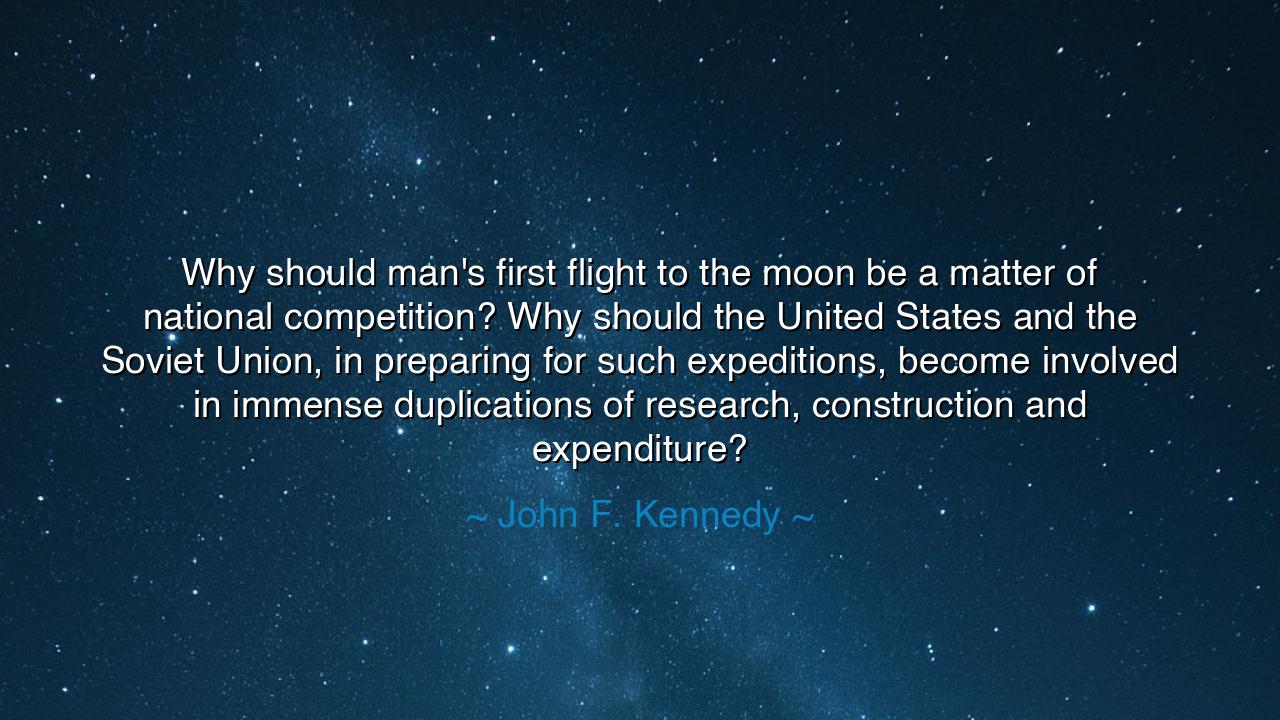
Why should man's first flight to the moon be a matter of national
Why should man's first flight to the moon be a matter of national competition? Why should the United States and the Soviet Union, in preparing for such expeditions, become involved in immense duplications of research, construction and expenditure?






Children, gather close, for I will speak of the vision of a leader whose words, though spoken long ago, resonate still with the cry for unity and shared purpose. John F. Kennedy once asked, "Why should man's first flight to the moon be a matter of national competition? Why should the United States and the Soviet Union, in preparing for such expeditions, become involved in immense duplications of research, construction and expenditure?" These words reflect not just a political concern, but a philosophical and ethical inquiry into the very nature of progress and the price of human division.
At the time Kennedy spoke these words, the Space Race was in full swing, with the United States and the Soviet Union engaged in a fierce battle to be the first to conquer the moon. The goal was grand—exploration, discovery, and a demonstration of the superiority of one nation's ideals over another’s. But, as Kennedy saw, this competition came at a great cost. Instead of pooling their resources, sharing knowledge, and working together toward a common goal, the two superpowers were pouring vast amounts of wealth, energy, and talent into duplicating efforts, competing against each other for pride and glory. This competition, while perhaps natural in human nature, was wasteful and led to a division that delayed the greater purpose of human exploration.
Kennedy’s words point to something deeper than mere politics. He saw that, in this pursuit, the human race was not so different from the ancient tribes who fought over territory and resources instead of uniting for the good of all. The Space Race—like the conflicts of old—was a reflection of division rather than unity, of pride over progress. Yet, Kennedy understood that the true purpose of space exploration was not to prove one nation’s superiority over another’s, but to expand human knowledge, to discover the unknown, and to unite humanity in the shared experience of discovery. This was a noble pursuit, worthy of collaboration, not rivalry.
Let us reflect, children, on the story of Alexander the Great, who in his campaigns across the known world did not merely seek conquest but the exchange of knowledge and ideas. When he ventured into the lands of the Persians, he did not simply seek to crush his enemies but to absorb their wisdom, their culture, and their inventions. His conquests were not just military in nature; they were intellectual, bringing Greek knowledge to the East and taking the Eastern wisdom back to the West. Alexander understood that true greatness lies not in defeating others, but in the sharing of knowledge and the collaboration between cultures. Had the ancient world been more willing to collaborate in the way Kennedy imagined for space exploration, they might have reached even greater heights.
Consider, too, the example of the Renaissance, when Europe was a patchwork of warring states, each vying for its own dominance. Yet, in the fields of art, science, and learning, there was a flowering of collaboration. Leonardo da Vinci, Michelangelo, and other great minds of the period did not work in isolation. They shared their ideas and discoveries across borders, lifting one another up in the pursuit of truth and beauty. They recognized that, although they came from different backgrounds, they were united in their shared humanity and desire for knowledge. It was through this spirit of cooperation that the Renaissance was able to achieve so much, in contrast to the divisions that marked previous centuries.
And so, children, Kennedy's words remind us that the pursuit of knowledge and progress should never be confined to national borders, to divisions that serve only to diminish our collective potential. His call for unity in space exploration is a call for unity in all things. When we are divided by competition and pride, we waste the precious resources we have—time, talent, and energy—on unnecessary conflict. But when we come together, when we set aside our differences and work toward a common good, the possibilities are endless. The exploration of space is not just about reaching other worlds; it is about reaching the heights of our own potential as a species, bound together in a shared vision.
The lesson, children, is simple yet profound: in your own lives, do not fall prey to the divisions that separate you from one another. Whether in your studies, your community, or the greater world, understand that collaboration brings forth greater progress than competition. As you move through the world, remember that it is the strength of your unity that will allow you to reach the stars. Let Kennedy's call to unite for the greater good of space exploration inspire you to look beyond your own self-interest and seek the common good. Just as the greatest human achievements have often come from shared efforts—whether in art, science, or discovery—so too can you achieve greatness when you collaborate, not compete, with those around you.






AAdministratorAdministrator
Welcome, honored guests. Please leave a comment, we will respond soon